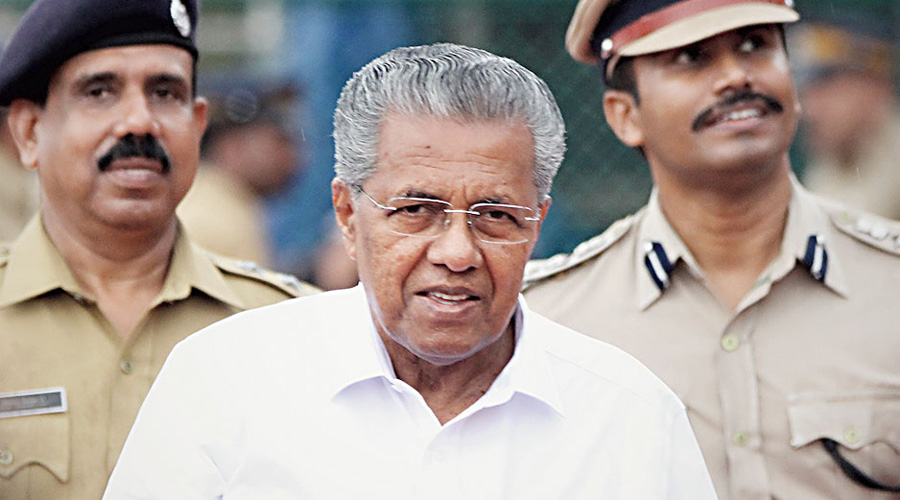Hundreds who protested or criticised the Citizenship Amendment Act have been booked in Kerala, RTI replies have revealed, triggering charges of a “double standard” against the Left Democratic Front government whose constituents too had demonstrated against the new citizenship regime.
Chief minister Pinarayi Vijayan had assured the state Assembly in early February last year that no cases had been registered against the anti-CAA protesters.
His government had got a resolution passed in the Assembly saying Kerala would not implement the new citizenship act. Left parties had organised marches and human chains against the act.
However, the Kerala chapter of National Confederation of Human Rights Organisations, the NGO that filed the RTI pleas, says 519 cases were registered against anti-CAA protesters in Kerala between January 1 and March 23 last year.
Several of those booked have alleged they did not participate in the demonstrations but only expressed moral support.
For instance, many social activists, writers and scholars who had issued a joint statement supporting a state-wide strike against the CAA on December 17, 2019, but say they never hit the streets figure among the 46 accused in a case registered in Kozhikode city.
“A huge majority of the 46 accused had only expressed solidarity in a joint statement.... They were not present at the protest,” Sajeed Khalid, state secretary of the Welfare Party of India (WPI), one of the organisers of the strike, told The Telegraph on Thursday.
“This shows the double standard of the LDF government, which says one thing and does something else,” said N.P. Chekutty, veteran journalist and activist who figures among the 46 accused.
“This government got the Assembly to pass a resolution against the CAA, and yet its police booked so many of us who had only extended support to the cause.”
The December 17 shutdown was organised by four parties deemed to enjoy Muslim and Dalit support: the WPI, Social Democratic Party of India, Bahujan Samaj Party and the Dalit Human Rights Movement Party.
Sunni Muslim leader Nasar Faizi Koodathayi, scholar J. Devika, writer T.T. Sreekumar, rights activist Gro Vasu, and writer and Dalit activist K.K. Baburaj are among those named in the Kozhikode case.
They have been booked under penal sections 109 (abetment), 143 (unlawful assembly), 147 (rioting), and 283 (obstruction in public way or line of navigation), which can entail a maximum punishment of two years. Sajeed said no sedition or terror charges had been invoked.
Reny Ayline, national secretary of the rights organisation that filed the RTI pleas, said the NGO had collated the data from answers sent by various police authorities, including individual police stations, from the middle of last year till January 2021.
Ayline said a few among the 519 cases had been filed in connection with protests organised by Left groups such as the CPI as well as the CPM’s student and youth wings, the SFI and the DYFI.
“I had no idea about the (Kozhikode) case until I got a call from the local police station about eight months ago,” Chekutty said.
“Recently, the court of the judicial magistrate first class summoned me to appear on February 16. I didn’t go and have asked my lawyer to seek some time.” He added: “The government is trying to silence independent voices in public life.”
A writer accused in the Kozhikode case accused the ruling CPM of “selective Islamophobia”. “The CPM can organise strikes on anything. But they feel threatened when the Welfare Party or the SDPI do the same. They identify these two small parties with Muslim extremism,” the writer, who declined to be named, said.
But he faulted the organisers too. “I had told them to secure police permission, but I understand that they waited till the last minute and went ahead without permission.”
State WPI president Hameed Vaniyambalam said the Kozhikode administration had denied permission for the December 17 protest despite allowing anti-CAA demonstrations by other groups on other dates.
“We had tried our best to obtain permission. I see this as the double standard of the LDF government, which supported the anti-CAA movement but slapped cases on us,” he said.
Kozhikode North MLA Pradeep Kumar of the CPM said: “It could be because of the Kerala High Court order that no hartal (shutdown) can be held without seven days’ notice and police permission.”
He added: “My understanding is that these are the penal sections usually invoked for participating in strikes without permission. Even pro-government strikes lead to such cases.”
A lawyer, however, said the charge of abetment — which enables the police to implicate a large number of people — is not usually invoked in such instances. This section would have been used to charge those who had not physically participated in the protests.
MLA Kumar said he would take up the concerns of those booked without having participated.











